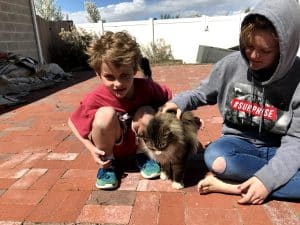
Young Women Lesson: How Can I Find Comfort in Jesus Christ When a Loved One Dies?
For this lesson, I think it’s incredibly useful to know what the experiences of the young women in your class have had in relation to death and grieving. Have any of them lost a parent, a sibling, a grandparent, a close friend, or somebody else? Do they have a friend who has lost somebody close to them? I would begin by asking about their experiences, and then also asking what we know as Latter-day Saints about death. My guess is that they will bring up eternal families, the resurrection, and that we can complete ordinances for deceased loved ones if they die before completing them in this life. Write the things they know about death on the board and be prepared to come back to them later in the lesson.
For much of the lesson, I’m using the framework presented in Chapter 13 of Chieko Okazaki’s book, Disciples, about how we can approach death and grieving when someone we love dies, as she gives both a faith-centered and pragmatic approach to how to cope with the death of a loved one. She writes,
When I lost [my husband], a great source of strength was the knowledge that kept ringing in my heart, “I don’t have to do this by myself.” You don’t have to do it by yourself either – neither death nor illness nor any of the trials that face you. “When ye shall search for me with all your heart,” the Lord told Jeremiah, “Ye shall. . . find me” (Jeremiah 29:13).
Remind the young women that no matter how alone we feel, the Savior is with us as we go through our trials. Sydney S. Reynolds, counselor in the General Primary Presidency, taught in 2003:
“Who shall separate us from the love of Christ? I am persuaded, with Paul, that neither tribulation, nor life, nor death, nor any other circumstance shall have the power to separate us from His love.”
Acknowledge to the young women that grief and death are hard. So often we tell people that “I’m so sorry for your loss, but I know that you’ll be together again in the eternities.” Encourage the young women to stop before the “but” in that sentence! President Russell M. Nelson once said,
Irrespective of age, we mourn for those loved and lost. Mourning is one of the deepest expressions of pure love. It is a natural response in complete accord with divine commandment: “Thou shalt live together in love, insomuch that thou shalt weep for the loss of them that die.” (D&C 42:45.)
Have the young women open their scriptures to John, chapter 11, and read verses 1-35. These verses contain the story of the death of Lazarus, brother to Mary & Martha. Despite having called for Jesus to come heal Lazarus, Jesus doesn’t come in time, and Lazarus dies, and is four days dead by the time Jesus arrives. And what does Jesus do, when he sees Mary and others weeping? He weeps with them (verse 35). He mourns with those who mourn. Despite knowing the plan of salvation, and even knowing that He would raise Lazarus from the death, Christ takes the time to mourn and allow them their grief. We need to recognize that for us, and for others, the emotional reality of what is happening to us. To quote Sister Okazaki on page 171 of Disciples, “Grieving is a process. It’s okay to experience that process. To deny the bitterness of the sorrow is to deny some of the sweetness of the comfort when it comes.” She later continues,
We need to understand the plan of salvation. It may not seem very comforting at times of pain and loss to think about the plan of salvation. It may seem too intellectual, too remote, and too theoretical to be very comforting. But each of us makes sense of our experience in a context. It is wise and truly comforting to see that context as a purposeful and loving plan – and especially as something we chose.
What do we know about the plan of salvation regarding death? Refer back to the suggestions on the board from earlier in the lesson. What about these doctrines can bring us comfort during times of grief?
Read 1 Corinthians 15:22. Remind the young women that the resurrection is a gift given to all, regardless of righteousness or temple ordinances. Because Christ completed the Atonement and was resurrected, we will also all be resurrected. Reading Mosiah 16:7-8 can also reinforce this concept (the sting of death is swallowed up in Christ). President Uchtdorf also spoke on this, saying,
That is why we are here on this beautiful planet earth—because God offered us the opportunity, and we chose to accept it. Our mortal life, however, is only temporary and will end with the death of our physical body. But the essence of who you and I are will not be destroyed. Our spirits will continue living and await the Resurrection—a free gift to all by our loving Heavenly Father and His Son, Jesus Christ. At the Resurrection, our spirits and bodies will be reunited, free from pain and physical imperfections.
This doctrine – of being whole again through the resurrection – can be especially comforting to those who have lost loved ones after painful disease or injury. Many are comforted by the idea of their loved one being able to walk, talk, eat, and rejoice again without infirmity or ailment hindering them.
As Sister Okazaki said above, sometimes knowing about the Plan of Salvation isn’t enough comfort. Elder Shayne Bowen describes the pain and sorrow he felt after losing his infant son, Tyson, to a choking accident:
It is impossible to describe the mixture of feelings that I had at that point in my life. Most of the time I felt as if I were in a bad dream and that I would soon wake up and this terrible nightmare would be over. For many nights I didn’t sleep. I often wandered in the night from one room to the other, making sure that our other children were all safe.
Feelings of guilt racked my soul. I felt so guilty. I felt dirty. I was his father; I should have done more to protect him. If only I would have done this or that. Sometimes even today, 22 years later, those feelings begin to creep into my heart, and I need to get rid of them quickly because they can be destructive.
About a month after Tyson died, I had an interview with Elder Dean L. Larsen. He took the time to listen to me, and I will always be grateful for his counsel and love. He said, “I don’t think the Lord would want you to punish yourself for the death of your little boy.” I felt the love of my Heavenly Father through one of his chosen vessels.
However, tormenting thoughts continued to plague me, and I soon began to feel anger. “This isn’t fair! How could God do this to me? Why me? What did I do to deserve this?” I even felt myself get angry with people who were just trying to comfort us. I remember friends saying, “I know how you feel.” I would think to myself, “You have no idea how I feel. Just leave me alone.” I soon found that self-pity can also be very debilitating. I was ashamed of myself for having unkind thoughts about dear friends who were only trying to help.
He then continues,
As I felt the guilt, anger, and self-pity trying to consume me, I prayed that my heart could change. Through very personal sacred experiences, the Lord gave me a new heart, and even though it was still lonely and painful, my whole outlook changed. I was given to know that I had not been robbed but rather that there was a great blessing awaiting me if I would prove faithful.
My life started to change, and I was able to look forward with hope, rather than look backward with despair. I testify that this life is not the end. The spirit world is real. The teachings of the prophets regarding life after death are true. This life is but a transitory step forward on our journey back to our Heavenly Father.
I would emphasize that while our faith in the plan of salvation can eventually help move us past our grief and our anger, it doesn’t usually eliminate it. Allowing ourselves to grieve is just as important as earnestly pleading with the Lord to heal our hearts and help us integrate our loss.
If we’re not the ones personally experiencing a death of a loved one, how can we help friends and family members navigate the waters of grief and loss? Joy F. Evans of the General Relief Society Presidency said the following in her 1989 General Conference address:
Helping others through a time of special challenge requires understanding and patience. People respond to grief in different ways. Not everyone recovers in the same period of time, and not everyone acts the same. The griever might be irritable, depressed, quiet, or withdrawn, but through kindness and friendship, he or she will almost always recover and will come to acceptance…Being sensitive to such needs helps everyone find joy in the precious reality of everyday living and look forward with faith to the future, knowing that sorrow and struggle and endurance to the end are necessary parts of mortality.
It is said that love is tested and proved in the fire of suffering and adversity. How sensitive we should be to those who are suffering or hurting, to those with special problems—the sister who has had a miscarriage or a stillbirth, a premature or handicapped child; the one whose beloved husband has died; the lovely woman to whom marriage and family have not yet come; the new convert whose family has rejected her because of her baptism.
What we do or say is not as important as that we do or say something—’I care about you,’ or ‘Let me help.’ Where love is, heart will respond to heart and burdens will be lightened.
We must never feel that we have done our share or had our turn.
Remind the young women that we have covenanted at baptism to mourn with those who mourn and comfort those who stand in need in comfort (Mosiah 18:8-10). How do we do that? What can we learn from Jesus’ example in the story of Lazarus? Jesus didn’t offer platitudes to Mary & Martha. He didn’t say that he knew exactly how they felt, nor that “everything happens for reason.” He didn’t allow their grief nor anger scare him away. He simply sat and wept with them.
We can also learn from the story of Job. Quoting from a beautiful blog post about Job and mourning on By Common Consent:
Following the devastating destruction of his livelihood and the deaths of his children, Job tears his robe and shaves his head. Falling on the ground, he worshipfully insists that what was the Lord’s always to give must by that same token be the Lord’s to take away. Soon, he is afflicted with painful sores all over his body. Now, he collapses in a pile of ashes, heavy with lamentation and grief.
When Job’s friends hear of their companion’s tragedy they immediately set out to find him and comfort him. Upon seeing him from a distance, covered in scabs and ash, they barely recognize him. Weeping for their friend, they too tear their robes and sit down in the ashes with him. They had come to comfort him, but there were simply no words available to speak his suffering and ease his pain. They sit with him in silent mourning for seven days and seven nights.
Later in the book of Job, his friends’ patience begins to fade as Job experiences affliction after affliction with no sign of wearing thin. His friends turn to judgment and scorn, thinking Job must have done something to deserve his suffering. This story provides excellent examples of how to mourn with someone (sit with them, be present) and how not to mourn with someone (judge them, think their mourning/afflictions are self-induced or that their grief is taking too long to resolve).
Being with people while they mourn can be uncomfortable, and we often want to offer words of comfort. I think that there is a time and place for offering words of comfort, but most often, it’s simply most helpful to sit and be present. Rather than offering explanations, or comparing their experience to one of your own, try to be present and sensitive to the whisperings of the spirit. Expressing sorrow and condolences (like “I’m so sorry for your loss” and “I care about you”) is generally more helpful than offering platitudes or comparisons (“God must have needed him/her in Heaven more than you needed them here” or “I know exactly how you feel – my hamster died last year and I cried for days”).
Being present while people mourn means that we’re not just present for the immediate aftermath, but also in the days/weeks/months/years that follow. It also means that we try to lift up and support those who mourn. How can we do this for our friends and family members? Have the young women brainstorm ways to support others through their grief. Examples could include bringing a meal, checking in with friends on important dates or anniversaries, offering to help them with logistics or regular life things (like cleaning, gardening, childcare) that may feel overwhelming, and offering to listen without judgment as they process through their feelings. Simply being a steady, non-judgmental presence in somebody’s life as they grieve can mean so much. And even if you don’t know the person well, offering condolences via Facebook, text, a card, flowers, or other culturally appropriate ways can mean so much. Even though your gesture or words may feel small, they really do mean a lot to those who are grieving.
I would close with a testimony of the Atonement, of Christ healing all wounds. I would emphasize that part of our doctrine is that God is a loving and merciful God, and that we can have faith in the plan of salvation while also allowing ourselves to experience grief and sadness. Remind the young women of their covenant responsibilities to mourn with those who mourn, and that empathy is a characteristic that we can cultivate and increase.
**********
Other resources on The Exponent:
The posts found in the “Mormons and Death” series, especially this Guide to Giving Comfort post (and the comments!).
Grief Lessons, in which Deborah lists what did (and didn’t) help her through a time of grief
Telling the Story of Grief, in which Julie talks about the grief that’s unique to being single in the LDS church
This lesson plan was originally written in 2017 as Young Women Lesson: How Can I Find Comfort in Jesus Christ When a Loved One Dies?






One Response
I so appreciate the gentle and compassionate way you handled this tough topic, Liz. I’m definitely using this in February with my young women (if I still have that calling). So many good reminders for all of us, too (especially those of us who approach people we love who are struggling with good intentions but often say the exact wrong things). Thank you.